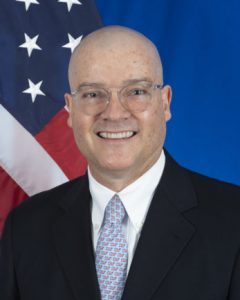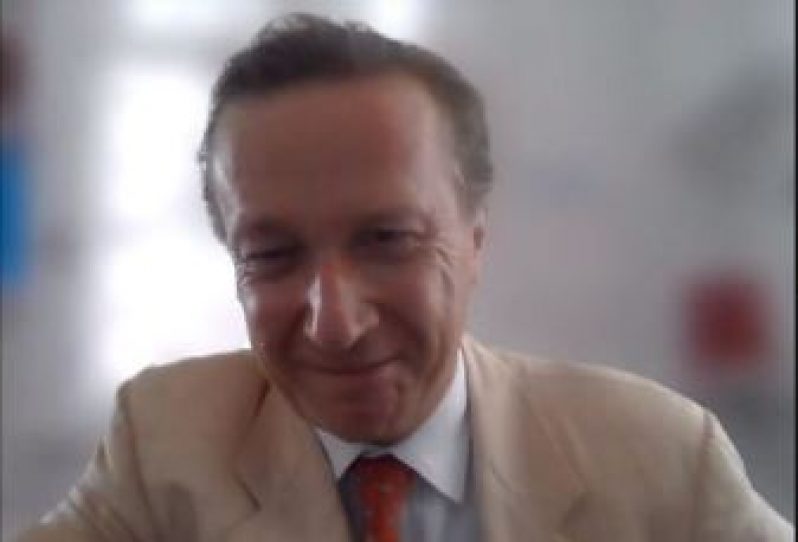— top US diplomat urges Guyanese to get vaccinated
THE United Nations Children’s Fund (UNICEF) has welcomed the physical reopening of schools in Guyana as the government launched the COVID-19 vaccine for eligible students on Thursday. Hailing the scheduled reopening on September 6 as a landmark day for Guyanese students, UNICEF Representative, Nicolas Pron said it will represent a day of hope and possibility as many students, some for the first time, will soon step into schools after many months of being at home.
“It is important that children return to school. Children have a right to education and to the safety and protection that schools provide. Except in the most extreme cases, the risks to children of being out of school are greater than the risks of being in school,” he said.
The UNICEF representative pointed out that school closures impact on students’ learning, health and well-being at critical developmental stages, with profound repercussions for each child, their family and the economy. He also noted that there is a risk that with prolonged closure of schools, many of these children will never catch up. The latest evidence, he said still shows that schools do not drive the spread of COVID-19 in the community and are indispensable to children’s overall development.

“School closures have the greatest impact on the most vulnerable children who are far less likely to have access to remote learning and more likely to be exposed to violence, abuse, neglect, and other risks. Their connections with teachers and friends are important and healthy attachments these children have. The longer children remain out of school, the less likely they are to return. I emphasise, schools are central to children’s development, safety and well-being!”
In commending the government’s efforts in making COVID-19 vaccines available to all eligible residents, and now eligible students, the UN official pointed out that this achievement has been attained by only a few countries, even as he recognises the efforts of COVAX partners, including the United States.
UNICEF over the past months has provided support to the Ministries of Education and Health and funding from the Global Partnership for Education (GPE) has ensured the continuity of learning, and increased water, sanitation and hygiene services at schools.
Pron also emphasised that UNICEF remains committed to continuing to provide support for Guyana and has assured the government that the UN has the best interest of every Guyanese at heart.
KEY PRIORITIES
On that score, he recommended three key priorities for recovery in schools. These are targeted programmes to bring all children and youth back in school where they can access tailored services to meet their learning, health, psychosocial well-being, and other needs; effective remedial learning strategies to help students catch up on lost learning; and support for teachers to address learning losses and incorporate digital technology into their teaching.
UNICEF, he said, is committed to support the government in this regard to ensure that all children get off to a good start and urged adherence to the national COVID-19 guidelines. “As schools reopen, we must not forget that while vaccines are one of the key tools in the response to the pandemic, other public health and social measures remain important. We must continue to observe the measures to keep every child and every teacher safe. Remember to wear your mask, wash or sanitise your hands regularly and maintain social distancing,” the UNICEF representative said.
Meanwhile, Chargé d’Affaires of the US Embassy in Georgetown, Mark Cullinane said the US was pleased to donate 146,250 doses of Pfizer vaccine to Guyana, nothing that these vaccines give Guyana’s children ages 12 and up the same opportunity to attend school safely as children in the US enjoy. He underlined that a common desire of parents around the world is to take every step possible to protect their children and the Pfizer vaccines will allow parents in Guyana to take that step. The Pfizer donated vaccines from the US have received full approval from the US Food and Drug Administration on August 23 for the prevention of COVID-19 in individuals 16 years and older. The vaccine is also available under emergency use authorisation (EUA) for individuals 12 through 15 years of age. The Centers for Disease Control has recommended that everyone 12 years and older get a COVID-19 vaccine to help protect against the virus. COVID-19 vaccines are safe and effective at preventing COVID-19 symptoms, including severe illness and death.
“Please get vaccinated, so we can beat this pandemic and move on with a productive, educated, and healthy Guyana, which is priority for the United States,” the US diplomat urges Guyanese.








.png)







